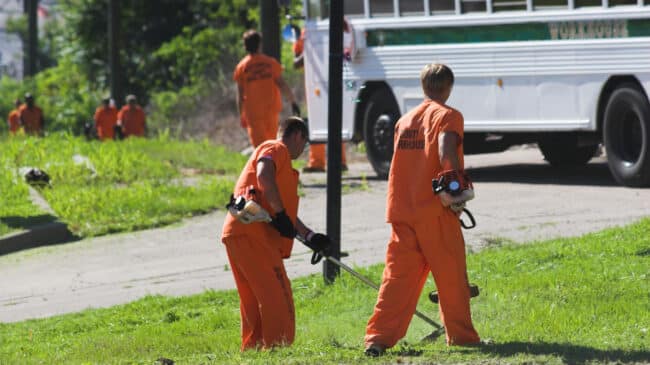Summary
Currently, the California state constitution forbids slavery or involuntary servitude. The state currently sometimes requires prisoners to work while serving their sentence. California Proposition 6 would change the state constitution, striking the current text and adding new language as follows:
Slavery is prohibited. Involuntary servitude is prohibited except to punish crime.
(a) Slavery and involuntary servitude are prohibited.
(b) The Department of Corrections and Rehabilitation shall not discipline any incarcerated person for refusing a work assignment.
(c) Nothing in this section shall prohibit the Department of Corrections and Rehabilitation from awarding credits to an incarcerated person who voluntarily accepts a work assignment.
(d) Amendments made to this section by the measure adding this subdivision shall become operative on January 1, 2025.
Fiscal Impact
According to the official fiscal impact analysis by the Legislative Analyst’s Office, Prop. 6 could have a positive or negative fiscal impact. As the analysis explains:
[I]f people in prison and jail no longer face consequences for refusing to work, prisons and/or jails might have to find other ways to encourage working. If this is done by increasing pay, costs would increase. If this is done by giving more time credits instead, costs would decrease because people would serve less time.
Proponents’ Arguments
Proposition 6 was referred to the ballot by the California State Legislature. State Assemblymember Lori Wilson (D-Suisun City), the lawmaker who authored the amendment, has argued:
Involuntary servitude is an extension of slavery…Today, slavery takes on the modern form of involuntary servitude, including forced labor in prisons. Slavery is wrong in all forms and California should be clear in denouncing that in the constitution.
Prop. 6 is also supported by several advocacy and non-profit organizations, including the American Civil Liberties Union. Carmen-Nicole Cox, director of government affairs with the ACLU California Action, has argued that the proposed amendment “is by and large about human agency and human dignity…Anything short of the ability to withhold, or even subsequently withdraw your consent to labor for the benefit of someone else, is slavery.”
Opponents’ Arguments
There is no official opposition to Prop. 6.
Discussion
The important symbolism of removing any use of slavery or involuntary servitude from the state constitution is obvious. In this case, convicted criminals lose many of their rights and may be required to work—involuntary servitude if they don’t want to work—but they don’t become property. Arguably the question Prop. 6 raises is whether prison managers forcing prisoners to work is just or not.
Work programs in prisons cover broad ranges of duties, from requiring inmates to do cleaning and repairs to selecting volunteers for cooking or laundry or similar duties, to working in real industries, sometimes with programs run by private companies. There are many pros and cons to these practices. A large-scale study by the National Institute of Justice found that inmates who work while in prison are significantly more likely to find work after they are released and are less likely to be rearrested or convicted for committing more crimes. This was voluntary work, however, not forced labor.
Some argue that overall prison work programs help make prisons more of a rehabilitative experience, while others say the prison work system is rife with abuse.
So, some might expect California to see improvements in its prisons from ending forced labor while others might predict more unemployed ex-offenders and recidivism if Prop. 6 passes. There is a sound argument that the strict language of the California state constitution, which is similar to the Thirteenth Amendment of the United States Constitution, should be interpreted as meaning that judges can sentence convicted criminals to labor (involuntary servitude), but that prison managers cannot take it upon themselves to require prisoners to work without the judge so sentencing them.
One concern about this amendment that was raised when a similar change was made to Colorado’s state constitution was that it would also ban judges from ordering community service. But courts have ruled that community service requirements are not involuntary servitude and so would likely uphold continued use of community service as a punishment even if this amendment passes.

